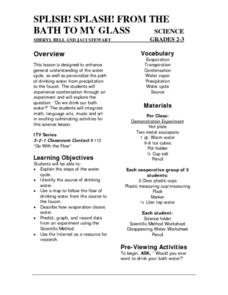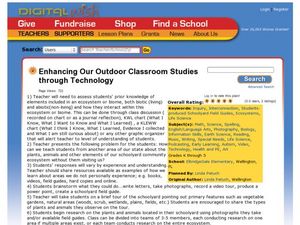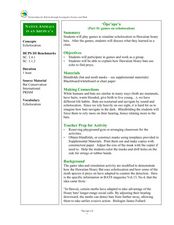Curated OER
Sounds like Science
Second graders create sound effects to produce a radio drama. In this sound lesson, 2nd graders read a book and provide the sound effects to transform it into a radio drama. They discuss sound and the shape of sound waves based on their...
National Wildlife Federation
The Water Cycle
Observe the water cycle from the comfort of your classroom with this excellent earth science experiment. Working collaboratively, young scientists first create terrariums complete with hills, plants, lakes, and an atmosphere,...
Curated OER
Applied Science - Science and Math Lab
Create three dimensional objects in an applied science lesson. The goal is for your class to recognize, compare, and model shapes. Using cookie cutters and clay or play dough, they create models for three-dimensional shapes.
May Media Group
Treatment Plants
Young scientists explore nature's water treatment plants in this simple science demonstration. By placing a stalk of celery in a cup of water mixed with food coloring, children are able to observe how plants absorb nutrients and...
Curated OER
Life Cycle of Trees
Turn your students into young tree-tectives with this fun science investigation into the life of trees. To begin, a class volunteer gets dressed up in a tree costume as the different parts of trees are introduced. Then, the class learns...
Agriculture in the Classroom
Six Kinds Do It All
Teach young engineers that all machines, no matter how complicated or complex, are made up of just six simple devices with this hands-on physical science lesson. Using the included templates, students first create paper models of...
Bonneville
Setting Expectations for Science and Engineering Projects
What is science? Sitting in a whole group discussion, scholars first share their ideas on science and how to conduct investigations. They learn about the steps for scientific inquiry and experimentation. Once finished, individuals then...
Curated OER
Whodunnit?
Want to create an exciting mystery activity? Investigators will identify the elements of a mystery, review mystery stories, then write their own mysteries. They engage in forensic science experiments related to mysteries and learn to ask...
Curated OER
Splish! Splash! From the Bath to my Glass
An excellent instructional activity on the water cycle! In it, learners should gain a general understanding of the water cycle, along with how water first falls as precipitation, then ends up coming out of our faucets. This instructional...
Curated OER
NASA Plans Moon Base
Learners react to statements about the moon, then read a news article about NASA's plans to build a permanent base on the moon. In this space science and current events lesson, the teacher introduces the article with a discussion and a...
Astronomical Society of the Pacific
Getting Ready for the All American Eclipse!
Give your pupils a front row seat at the biggest light show in the sky this year! In addition to admiring the total solar eclipse, young astronomers can explain the phenomenon with a little help from an inquiry-based instructional...
Curated OER
Blow the Best Bubbles
Here is an exciting, and meaningful science instructional activity on the formation of bubbles! Young scientists have three cups with a variety of solutions in them. One cup has detergent only, one has glycerin added to it, and the third...
Population Connection
Lessons From the Lorax
Is progress progressing too fast? So believes the Lorax, the eponymous character from Dr. Seuss's The Lorax. Young environmental science students read the book and debate the arguments of the Lorax and the Once-ler regarding the value of...
California Academy of Science
Composting: A Scientific Investigation: California Academy of Sciences
Garbage, recycle, compost: Does it really matter where we put our trash once we are done? By making detailed observations over seven weeks, kids will see which materials break down naturally to become a healthy part of the soil, and...
Curated OER
Lesson Plan for Science Class: Journaling
Students complete science journals to learn about the science process using a fern as study material. In this science journal lesson plan, students research the resurrection fern. Students observe the fern in dry and moist conditions and...
Desert Discoveries
What's In A Habitat?
The concept of a habitat being a home for animals is the main thrust of this life sciences resource. Learners complete a cut-and-paste activity using a fine worksheet that's embedded in the plan. They must place four very different...
Curated OER
Return to the Moon
Students react to statements about space exploration, then read a news article about plans to resume manned flights to the moon. In this space science and current events lesson, the teacher introduces the article with a discussion and...
Curated OER
Enhancing Our Outdoor Classroom Studies through Technology
Combine science, math, and more using this resource. Learners use technology to share video and other information about their community with people throughout the state. They learn about the environment, identifying native plants, record...
Curated OER
Games on Echolocation
Get a little batty with life science! This fun simulation game replicates how bats use echolocation to hunt moths in their native Hawaiian habitat. After creating blind folds and discussing some basic principles of echolocation, students...
Alabama Learning Exchange
Make a Difference!
We are very dependent upon other life forms around us to survive. Here, scholars explore relationships in the ecosystem with the help of Auntie Litter and the pollution patrol. They imagine a world without grass, making connections to...
Baylor College
How Much Water Do Humans Need?
Physical or life science learners measure the amounts of water eliminated by intestines and the urinary system, and the amounts lost via respiration and perspiration. In doing so, they discover that the body's water must be replenished...
Baylor College
Plant Parts You Eat
Plants provide a variety of delicious foods essential for human survival. In the fourth lesson of this series on food science, young scientists investigate common fruits, vegetables, and grains in order to determine which plant part is...
Baylor College
Bio Build-up
Trace pollutants through the environment in the seventh lesson of this series on the science of food. Looking at a picture of the plants and animals in an aquatic ecosystem, learners use dot stickers to represent harmful chemicals as...
Baylor College
They're Everywhere: Bacteria
Totally gross out your class with the eighth lesson plan in this series on food science. Explore the microscopic world of bacteria by taking swabs of different classroom objects and growing colonies in petri dishes. An engaging activity...
Other popular searches
- Earth Science
- Physical Science
- Life Science
- Science Project
- Science Space
- Environment Science
- History of Science
- Environmental Science
- Pe Science
- Family and Consumer Science
- Consumer Science
- Social Science

























